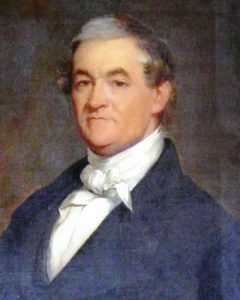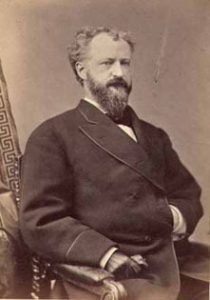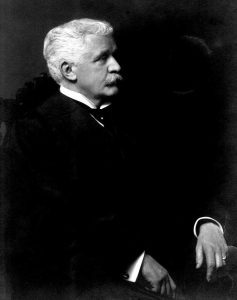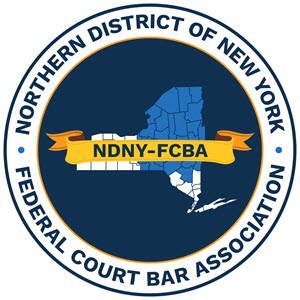Christopher R. Riano
Assistant Counsel to the Governor and Lecturer in Constitutional Law and Government at Columbia University
The judicial and political history of Northern New York is replete with dynamic legal stories that have helped shape not only how the Northern District looks today, but also how jurisprudence has developed in a number of legal areas that remain critical to our current understanding of American law. In one rare case, the fruitful family tree of a distinguished Northern New York family shaped the judicial and political landscape of our state and our nation.
Long before today’s political dynasties developed, the Conklings of New York were celebrated throughout the 18th, 19th, and 20th centuries as some of the most distinguished lawyers, jurists, and politicians in the country. At one time the members of the family were so powerful that one of them turned down a nomination to the United States Supreme Court––not just once, but twice. In fact, the second time he rejected the nomination to the United States Supreme Court, the nomination had already been confirmed by the United States Senate.

United States District Judge Alfred Conkling
The political dynasty of the Conkling family has its origin in Alfred Conkling. Born in October 1789, Alfred Conkling followed a rather typical path for the American gentry at that time. In his early life, Alfred graduated from the first college chartered by the New York Board of Regents–Union College–in 1810. After reading law in 1812, he continued in private practice before being appointed as the District Attorney of Montgomery County in 1819. In March of 1821, Alfred was elected to the United States House of Representatives for a single session, and in August of 1825, he was nominated by President John Quincy Adams to the Northern District of New York, the third Judge to ever sit on the Court. He served on this Court, as its only Article III Judge, from 1825 until 1852.
Judge Alfred Conkling had several major, nationwide influences on the rule of law in this country, as well as on the judiciary at large, during his service on this Court. I want to focus, however, on two particular impacts that contribute to his singular stature in U.S. judicial history.
First, Judge Alfred Conkling was a first-rate academic and judicial scholar, and his opinions and writings on admiralty law in particular are, to this day, referenced and even available for sale. His still important treatise on admiralty law, The Admiralty Jurisdiction, opens beautifully as follows:
The revival of commerce after the subversion of the Maritime Courts of [the] Western Empire of the Romans, soon led to the institution of enterprising commercial states bordering on the shores of the Mediterranean, of maritime judicatories under the name of consular courts, and to the complication of maritime codes combining the wisdom of the civil law with the customs and usages of the sea. The great utility of these tribunals commended them to other powers, and soon led to the establishment of similar courts by all the maritime nations of Europe. These courts were invested with a comprehensive jurisdiction relative to matters, whether of contract or tort, pertaining to navigation and commerce. . . . Congress, at its first session, in the exercise of its power . . . instituted the district courts, and invested them with exclusive original cognizance of all civil causes of admiralty and maritime jurisdiction. The district courts of the United States are, therefore, courts of admiralty.
The fact is that the third Judge on the Northern District set an impressive standard for the quality of this bench, but he was also the definition of a civically virtuous judge’s judge. In one of his other early academic works, A Treatise on the Organization, Jurisdiction and Practice of the Courts of the United States, Judge Conkling opens with a particularly generous note:
To the Junior Members of the American Bar and the Students of Law in the United States, in the hope that it may contribute in some degree to their advancement and success in the honorable professor to which they are devoted, and with sentiments of the most sincere respect and cordial good will, the following treatise is inscribed by the Author.
Judge Conkling was dedicated to being a mentor to the younger lawyers in the community, and as a prolific speaker you can find copies of his speeches online, including one to the Graduating Class of the Law School of the University at Albany from March 27, 1856. Prior to the United States Civil War, Judge Alfred Conkling left the bench for a yearlong stint as the United States Minister to Mexico; he later settled down in Utica, New York, where he died and was buried in the Forest Hill Cemetery.
In addition to his jurisprudence and academic work, he was deeply focused on the successes of his own family, which helped his children to further the family name for over a century to come. Between his three sons and two daughters, Judge Alfred Conkling raised an entire family to help continue his work and cement the family’s place in American politics.
His one son, Aurelian Conkling, studied law and eventually was selected to serve as the Clerk of Court for the Northern District of New York. Another son, Frederick A. Conkling, was born in 1816, and eventually attended the Albany Academy. Following a stint as a mercantilist, he served in the New York State Assembly and was eventually elected to the United States Congress in the same cycle that elevated Abraham Lincoln to the Presidency. During his time in Congress, he was the Chair of the Ways and Means Committee, prior to his reelection loss in 1862. Frederick Conkling eventually ran for Mayor of New York, before settling down back into his mercantilist lifestyle within New York City.

United States Senator Roscoe Conkling
It would be Frederick’s younger brother, Roscoe Conkling, who would prove by far to be the most powerful politician of the family after his father. In fact, Roscoe Conkling would go on to be commonly described as the most influential politician in the most powerful state in the union. Born in October of 1829 in Albany, Roscoe Conkling was steeped in politics very early on. Between his innate intellect and “large and massive frame,” Roscoe proved an intimidating figure for those who met him. Following his schooling in New York City, he opted to skip college and study law in Utica. He was known throughout Utica for his signature wit, and by 1850 he was picked to be District Attorney of Oneida County by New York Governor Hamilton Fish.
Upon returning to Utica, he ran and won office as Mayor in 1858, and was similarly elected while serving as Mayor as a United States Congressman in 1859, where he was joined by his older brother Frederick. While he lost reelection in 1863, he ran again and won in 1865, and served as a Congressman until 1867, when he was elected by the New York State Legislature to the United States Senate. It was in the United States Senate that Roscoe began to really gain his political footing. Senator Conkling was a stalwart defender of President Lincoln’s conduct during the Civil War, and a drafter and avid supporter of the 14th Amendment. With the election of President Grant in 1869, Roscoe Conkling became one of the most outspoken protectors of the President’s administration and one of the leaders of the Republican Party. By 1873, President Grant was appreciative and offered Roscoe Conkling the seat of Chief Justice of the United States, which Conkling declined, believing that he had a far more influential and powerful position as Senator than as Chief Justice.
It is interesting to reflect on how Roscoe Conkling became so powerful so quickly on a national scale. While all praised his oratorical prowess, and it did not hurt to be aligned with Lincoln and then Grant, many criticized his “haughty distain, his grandiloquent swell, his majestic, supereminent, overpowering, turkey-gobbler strut . . . .” Roscoe was an infamous philanderer, even while he rejected vices such as tobacco and whiskey. But it is important to remember that Senator Roscoe Conkling was serving as a United States Senator prior to the 17th Amendment being proposed, and as a result he was accountable not to the people of New York, but instead to the elected representatives within the legislature of New York. Furthermore, in the time of Tammany Hall, Senator Roscoe Conkling was the Federal Official who controlled Federal patronage in the State. Of course, this included the New York Custom House in New York City, the nation’s largest commercial port. Because of this, Senator Conkling could, and did, appoint allies to these positions in return for their support in keeping him in power. Among all of the prominent politicians of the time, there was no politician more vocal than Senator Roscoe Conkling about the merit of continuing to control the patronage appointments in their own state.
However, the concepts of patronage and graft lost popularity during the late 1870s. When President Garfield was elected in 1880, he began not to appoint the candidates whom Senator Roscoe Conkling desired to the Federal posts in New York. Senator Conkling resigned from the United States Senate in May 1881, believing he could run and be elected to the New York State Legislature. Before he had a chance to run, on July 2, 1881 President Garfield was assassinated by Charles Guiteau, who himself was a disgruntled office seeker and claimed he wanted to protect patronage by making way for Vice President Arthur (who happened to be an ally of Roscoe Conkling, who had helped secure him the Vice Presidential spot). Roscoe was unable to secure election to the New York Legislature, and President Arthur soon offered Roscoe Justice Ward Hunt’s seat on the Supreme Court.
Not only did the President nominate him, but he had the Senate confirm Roscoe to the seat, before Roscoe Conkling declined to accept. While Roscoe would go on to have a short career in private practice, including when he worked on the critical 1882 San Mateo County v. Southern Pacific RailRoad case that eventually helped define the early meaning of the Equal Protection Clause and led to the development of the doctrine of substantive due process, Roscoe Conkling grew old and sick before he would see much of his jurisprudence develop into substantive law, and he died in New York City in 1888.

Federal Judge Alfred Conkling Cox, Sr.
Although he was the most prominent politician, Senator Roscoe Conkling was not the end of the Conkling dynasty. Alfred Conkling Cox, Sr. (a grandson of Alfred Conking) was born in 1847 and would go on to study law and enter private practice in Utica like much of his family. He was managing the Utica State Hospital when, in 1882, President Chester Arthur nominated him to a seat on the United States District Court for the Northern District of New York. He served on the Court from 1882 until 1902, when he was nominated by President (and former New York Governor) Theodore Roosevelt to the United States Court of Appeals for the Second Circuit. He served on the Second Circuit until 1917, and he was frequently mentioned for elevation to the United States Supreme Court. Judge Alfred Conkling Cox, Sr.’s son, Alfred Conkling Cox, Jr., also became a well-known Federal Judge on the Southern District of New York, serving from 1929 to 1957.
For a single family to have such an amazing influence in politics and the law is astonishing, with at least one United States Senator, a few United States Congressmen, multiple Federal Judges on the Northern District, Southern District, and the Second Circuit, as well as a Clerk of Court. The Conkling family serves as a historical example of a celebrated Northern New York family that had an influence both locally and nationally, and is worth both renewed study and continued admiration.

